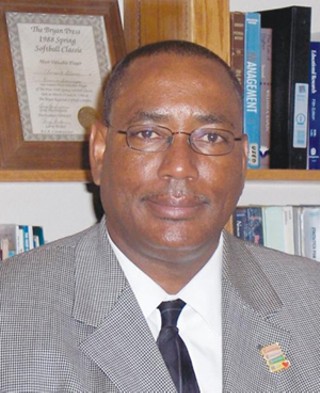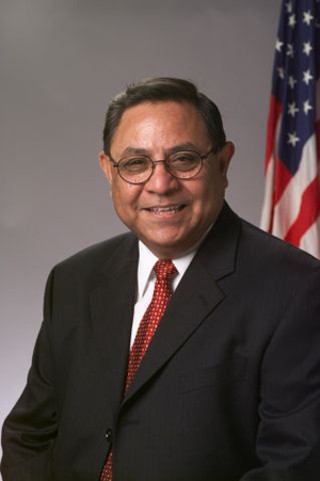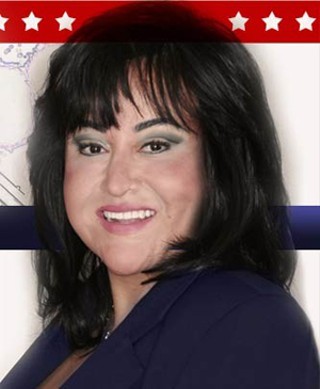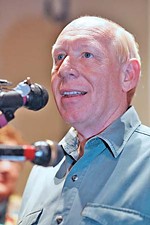Dems for Governor: Bill White, et al.
White stands out as Dems' best shot
By Richard Whittaker, Fri., Feb. 19, 2010

By early afternoon Feb. 6, Democratic gubernatorial hopeful Bill White was on his fifth meet-and-greet of the day. For a candidate acknowledged by his closest allies to be more policy steak than campaign sizzle and with less than a month to go before the March 2 primary, he was finding the rhythm of life on the trail. At the state AFL-CIO Committee on Political Education convention at Austin's Omni Hotel Southpark, with uncharacteristic humor he took square aim at his main target: Gov. Rick Perry and Perry's ultraconservative allies on Fox News. He told the assembled union reps: "Wouldn't it be sweet? November, Sarah Palin is looking at the camera, covering the elections. She's reading the results, and she says: 'Oh my gosh. Look at what's happened in Texas. My friend, Rick Perry, bit the dust. Bill White, a Democrat, has been elected governor of Texas.'"
Ever since the "Draft Bill!" campaign started last fall and the former Houston mayor and ex-U.S. deputy secretary of energy switched from the stalled U.S. Senate race to replace Sen. Kay Bailey Hutchison in December, Democrats have worked from two presumptions. One, that Perry will either win the Republican gubernatorial primary outright on March 2 or survive an April 13 run-off. Two, that White is currently their best hope to break the GOP stranglehold on statewide offices.

The big concern for Democrats is White's relatively low profile outside of Houston. Multiple polls show between a quarter and a third of potential Democratic primary voters undecided at the beginning of February. More worrying for downballot candidates hoping for a leadership push in November, Republicans touted a Feb. 2 Rasmussen poll that indicated White couldn't defeat any of the three GOP primary candidates – incumbent Perry, Hutchison, or Debra Medina – in a snap general election. At a breakfast before the AFL-CIO meeting, state Sen. Royce West, D-Dallas, an early White endorser, told the Coalition of Black Democrats that White's relatively low name recognition was reminiscent of his 2003 run for mayor in Houston. "He didn't attempt to go out and woo every big-name politician," said West. "He worked the community and the activists in the community, the precinct chairs, the homeowners associations, to get a sense of what the issues were from their point of view." The end result was what Democrats hope he'll repeat in November: "He was the underdog in the race, and all of a sudden he emerged as mayor."

One reason that Democrats back White is, bluntly, cash. When Ambassador Tom Schieffer stepped out of the primary on Nov. 23 and asked White to step in, he told the Chronicle that he'd had trouble finding that first big donor, the one who would convince other donors that he was a serious candidate. White, he argued, would have no such problem. That's one prediction that's come true: With a $6.4 million war chest at the beginning of the year, White went on to out-raise every single gubernatorial candidate, Democratic or Republican, in January.
While the Democratic establishment and most activists support White, the former Houston mayor isn't alone on the primary ballot. There are six more names, mostly concentrating their agendas on issues of workers' rights and rebuilding Texas' shattered manufacturing base. Like White, San Antonio physician Alma Aguado started off in the Senate race but has since joined the governor hunt as well (as of Feb. 15, her website still carried her Senate platform). Felix Alvarado, who was blown out of the water by an almost three-to-one margin in his 2002 congressional challenge to Republican Joe Barton, proposes fixing the Texas economy by ending job outsourcing and taxing casinos. Private investigator Bill Dear – the only candidate running as a "Conservative Democrat" – promotes a tough-on-crime agenda balanced by tax breaks for the elderly and free school meals. Education is the core issue for Prairie View A&M associate professor Clement E. Glenn, but his proposal to supplement public schools by using places of worship "to fill a supervisory, educational and recreational void that exists in our communities" may well raise the eyebrows of supporters of the constitutionally enshrined separation of church and state. "Star" Locke (he says John Wayne gave him the nickname after a bar fight) has taken up the traditionally Republican issue of border security: He wants a standing army of 30,000 troops to break the Mexican drug gangs and end the slave labor conditions that drive Mexican workers into the U.S. job market; unfortunately for him, his unreconstructed use of terms like "wetback" at candidate forums has drawn hisses from audiences. All except Dear have now filed a suit against PBS affiliate KERA for excluding them from the sole Democratic gubernatorial debate – a decision that KERA explained in advance as being because none of the five met its minimum standards for inclusion.

The only Democrat apart from White to take part in that Feb. 8 debate was Farouk Shami, founder of the CHI (aka "cationic hydration interlink") hair care empire. What distinguishes Shami from the other five underdogs? He, like White, can get money into his campaign; unlike White, he is almost completely self-funded. Between his exploratory committee and his main campaign accounts, Shami has sunk $7.45 million of his own money into his run, while receiving only about $60,000 in donations. Campaign manager Vince Leibowitz explained this strategy: "Farouk Shami will not be beholden to special interests." (Leibowitz and other senior staff have since quit Shami's campaign. See "Naked City.")
While Shami has stumped heavily, especially in the Valley, much of his war chest has gone into a massive TV and online ad buy, with $425,000 going to consultants Fortune Media Inc. in January alone. The ads promote Shami's positives and bold promises – e.g., that he will create 100,000 new jobs in two years or he'll resign as governor and pay the state $10 million. Meanwhile, his campaign has issued multiple press releases savaging White on every issue from poverty in Houston to gas drilling in the Barnett Shale. Leibowitz said, "Other than the blow of hurricanes Katrina and Rita that have descended upon him like a shroud, you cannot find a great positive record of improvements that he has made for the average person in Houston."
The comments reached a low when Shami's campaign accused White of racism for saying, "Nací en San Antonio" ("I was born in San Antonio") in one of his TV ads. Interpreting this as somehow a slur against his Palestinian heritage, Shami told supporters in McAllen: "I take that as a racist comment. ... I'm a better Texan than [White] could ever be." According to Leibowitz, that's not "negative campaigning." Defending the torrent of press releases, he said, "It's not going negative when you highlight the contrast between you and your opponent." White responded that racism is a serious charge that should be reserved for actions that actually deserve it.

White's candidacy has been just as tough on the GOP (without the potentially defamatory slurs); he used the single TV debate to reach out to a statewide audience, taking on Perry more directly than his Democratic opponent.
So far, polling in the Democratic race has been spartan, with attention centering instead on the frantic Republican tussle. A Feb. 4-7 automated phone survey by Public Policy Polling put White at 49%, while a Feb. 3-6 Texas Credit Union League poll gave him 51%. The same polls leave Shami, even after his massive spending spree, in the high teens and everyone else in single digits. While undecided voters and large margins of error mean no one can rule out a run-off, it is telling that both polls took place in the opening hours of White's shift from grassroots to big media campaigning, mere days after he released his first TV ad and before the KERA debate that every independent analyst agreed White won conclusively.

Yet a March win for White will be Pyrrhic if he can't dislodge the Republicans from the Governor's Mansion. His post-primary challenge will be to pick up alienated progressives who backed Shami for whatever reason, plus centrists and moderate but alienated Republicans, to establish the sort of consensus that he argues marked his time in Houston – all this, while generating enough excitement to bring out the statewide Democratic base. White surmised: "There are some politicians that seek to polarize the electorate and exaggerate differences on issues in order to gain support. I'm one of those that tries to find common ground, and Texas needs that right now."
See footage of a day on the campaign trail with Bill White online here.
Got something to say on the subject? Send a letter to the editor.










